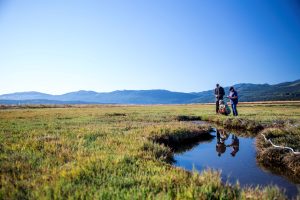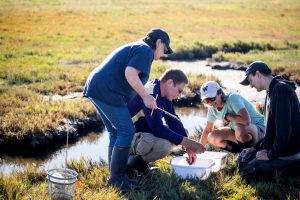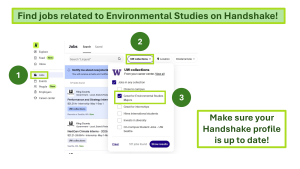Career Pathways
 The Environmental Studies major is a dynamic field of study that provides interdisciplinary training in the social sciences, humanities, and natural & physical sciences. The career pathways open to students are numerous with alumni making a difference in conservation organizations, environmental education and communications, sustainable agriculture, environmental mediation, and many other areas.
The Environmental Studies major is a dynamic field of study that provides interdisciplinary training in the social sciences, humanities, and natural & physical sciences. The career pathways open to students are numerous with alumni making a difference in conservation organizations, environmental education and communications, sustainable agriculture, environmental mediation, and many other areas.
Maximize Academic Experience
A useful place to start is making sure the courses you take align with your career goals. For example, the Integrating Disciplines afford plenty of opportunities for students to take courses that will provide them with specific skills for the job market. Many students also have the flexibility to add a minor or even a double major to complement their Environmental Studies major. Meet with an ENVIR advisor to discover the possibilities!
In addition to elective courses, all Environmental Studies majors are required to complete the Capstone Experience sequence which includes a ten week internship with one of our site partners, as well as the completion and presentation of an original research project. Below are examples of topic areas for Capstone internships. These often mirror career pathways that students choose to pursue after graduation.
Agriculture & Food Systems
Business & Sustainability
Education & Outreach
Natural Science & Restoration
Policy & Regulation
Career Development Tips
- Get experience: Seek out internships, field courses, or volunteer opportunities to explore possible career pathways. Get involved with an environmental student group as a great starting point!
- Utilize online resources: Check out the Environmental Career Resources website for more information and support. Visit the UW Career & Internship Center website to take advantage of many career planning services from Career Coaching Appointments to Resume Writing Basics or consider enrolling in the Industry Mentorship Program or LinkedIn Learning!
- Discover where ENVIR alumni have been hired: Follow the instructions shown below to browse the Environmental Studies collection on Handshake:
- Reflect: Take time each quarter to check-in on your progress and experiences. Keep track of what activities and courses have been a good fit and also those that have not! Consider why to help shape your professional formation.
- Talk to ENVIR faculty: Visit office hours and ask them for advice specific to your interests and goals.
Pursuing Graduate School
Further education in graduate school is a common pathway for students wanting to continue their education at a higher level. If you decide to pursue graduate school, you should do so with a clear personal or professional goal in mind. Students who pursue graduate school do so in a variety of fields, including law school, communications, policy, business, as well as environmentally focused areas.
Some example pathways to graduate school and beyond include:
- Masters of Business Administration to Sustainable Business Consultant
- Masters of Environmental Affairs to Policy Analyst
- Masters of Forestry to Urban Forestry Coordinator
- PhD in Geography to University Researcher/Professor
- Law school to Environmental Lawyer






